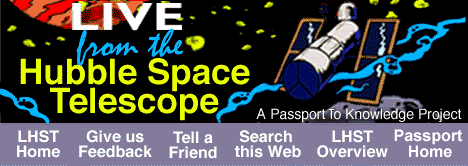


UIT flew aboard the Space Shuttle in 1990 during the Astro-1 mission and again in 1994 during the Astro-2 mission. The telescope was hoisted above the ultraviolet absorbing atmosphere along with several other instruments and operated nearly continuously for the duration of the mission. Upon return to Earth, the photographic plates from UIT were digitized for use with image processing software.
As an undergraduate, I spent time working with various calibration tasks along with studies of what the typical shape of a star is on one of these plates. Due to various observational circumstances, many problems surround the processing of UIT data. Some of these are due to the difficulty in pointing the telescope and keeping it stable, but most are due to the problematic scanning and digitizing of the images. Unlike other astronomical data, which is usually taken with CCD (digital) cameras, photographic data is subject to the usual problems with film, including scratches, hair, and dust. Also, film has a much smaller dynamic range than a CCD. So the analysis of a UIT image requires careful study of these effects beforehand.
Currently, I am working with several UIT images of the M33 galaxy. By comparing the brightnesses of stars in the ultraviolet with their brightnesses in visible light (obtained from ground-based telescopes), it is possible to determine the temperatures and spectral types of these stars. Interesting stars can be submitted as proposals for study with Hubble Space Telescope.
My interest in astronomy goes back to about tenth grade. I became fascinated with a book called "Our Universe" by National Geographic. The pretty pictures and interesting descriptions of the planets made me wonder how people knew all of these things. In twelfth grade I had the opportunity to take an astronomy class at my high school, and I really enjoyed it. So when I arrived at Johns Hopkins in the fall of 1990, I decided to switch my major from computer science to physics.
During my junior year, I studied abroad at the University of St. Andrews in Scotland. They offered a good selection of astronomy courses, and it was also nice to get away from the big city for a while. During my senior year I applied for PhD programs in astronomy, but was not successful in securing funding. With several of my friends going into education, I had some opportunities to get a feel for the classroom. I have since decided that I want to move into science education, and am thus pursuing the master's degree in education.
I intend to become a high school physics teacher next year in the private schools sector. Although I enjoy the intellectual challenge which comes from working in a research science, I feel that being in the classroom allows me to use my knowledge in a way which will have a greater positive impact. While as a researcher, I may advance the knowledge in my particular field, as a teacher, I can impact a great number of students. If only three or four of my students decide to become scientists I have already had a greater impact on the future of science than if I had stayed a researcher.
I guess I should say that I had several great high school teachers that really fostered my interest in science. My parents also supported me by buying me a small telescope and a computer. I didn't really have any science role models, although I remember reading Stephen Hawking's "A Brief History of Time" my senior year in high school and wondering when I would have enough physics background to understand it as he did. Little did I know that learning is a life-long process and that graduating from Johns Hopkins with a physics degree was just the beginning of my education (in physics and in life).
Other than my obvious interest in science, I am greatly interested in both music and sport. I practice the Korean martial art of Taek Won Do on a regular basis, and play classical and folk guitar. I also enjoy almost any type of outdoor activity, including hiking, camping, skiing, and mountain biking. As my current research requires extensive computer work, I enjoy getting outside in the fresh air (of Baltimore!) whenever possible.
To all students, I say that it is a myth that people like scientists have always known what they wanted to do and have been focused on that since they were small. While this is true of some scientists (and doctors, and politicians, etc.) I have found that many of my friends went through college without a clear sense of their future careers. Remember to enjoy your education and don't focus on any one subject for too long - leave that for your last couple years of college. Also, don't let anybody tell you that you are incapable of being what you want to be. Its sounds like something a teacher would say (I guess I will be one shortly anyway so I am allowed), but with enough hard work, you can achieve almost anything. Hey, if I made it here, so can you. Trust me.

![]()